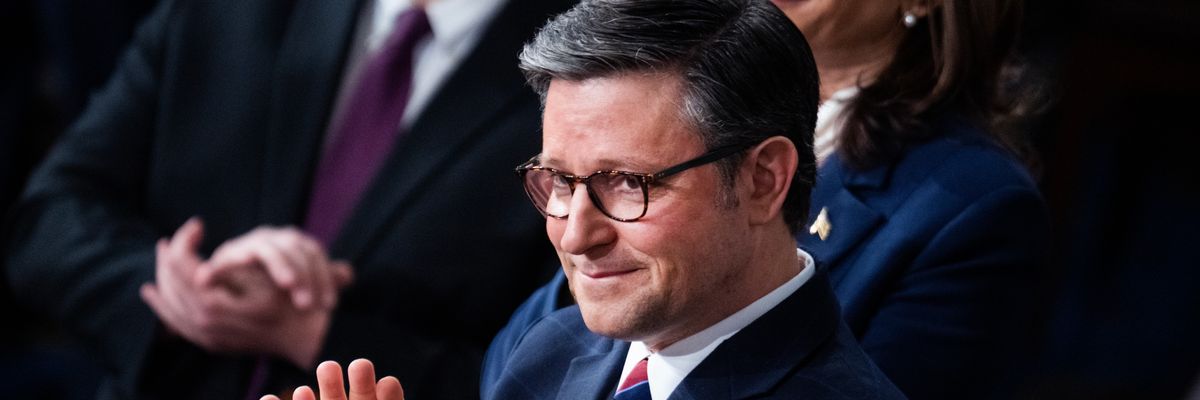The U.S. House on Friday passed legislation to expand a major mass spying authority after voting down a bipartisan push to attach a search warrant requirement to the
heavily abused surveillance law.
The bill to reauthorize Section 702 of the Foreign Intelligence Surveillance Act (FISA) for two years passed by a vote of
273-147, with 59 Democrats and 88 Republicans voting no. More Democrats voted for the bill than Republicans.
With Section 702 set to expire next Friday, the legislation now heads to the U.S. Senate.
"Despite a litany of abuse—improper snooping on protesters, lawmakers, thousands of campaign donors, and journalists—the House today wrote the FBI and intelligence agencies a blank check to keep misusing FISA Section 702,"
said Jake Laperruque, deputy director on surveillance at the Center for Democracy & Technology.
"This bill's only 'reform' to U.S. person queries is simply codifying agency rules that have already proven grossly inadequate at stopping abuse of FISA 702," Laperruque added. "If this bill becomes law, in two years Congress will be back debating this same issue, no doubt with even more examples of law enforcement abusing the backdoor search loophole to conduct warrantless surveillance of Americans."
"The FBI has invaded the privacy of members of Congress, a state court judge who reported civil rights violations by a local police chief, Black Lives Matter protesters, and more."
The measure's final House passage came after a handful of closely watched amendment votes.
One amendment led by Rep. Andy Biggs (R-Ariz.) and
endorsed by the Congressional Progressive Caucus would have required U.S. intelligence agencies to obtain a search warrant before surveilling Americans' communications under Section 702, which allows the federal government to spy on non-citizens located outside of the country without a warrant.
Americans who communicate with people overseas regularly have their correspondence—including emails, texts, and phone calls—
hoovered up by U.S. intelligence agencies under Section 702.
The Biden White House aggressively opposed the warrant requirement, trotting about
familiar talking points claiming the amendment would endanger U.S. national security. Attorney General Merrick Garland and White House National Security Advisor Jake Sullivan both called members of Congress personally to pressure them to vote against the protection demanded by civil liberties advocates.
The amendment vote closed with a
212-212 tie, meaning it failed.
Elizabeth Goitein, co-director of co-director of the Liberty and National Security Program at the Brennan Center for Justice, accused the White House and House Intelligence Committee Chair Rep. Mike Turner (R-Ohio) of "truly shameless misrepresentations" of the amendment.
"Opponents branded the notion that the government should need a warrant to read Americans' communications—the core of the Fourth Amendment and the guiding principle for searching Americans’ private correspondence for more than 200 years—as 'extreme,'" Goitein wrote on social media.
Turner claimed requiring a warrant to collect Americans' communications would allow the Chinese Communist Party, Hezbollah, and Hamas to "fully recruit in the United States."
"Many members who tanked this vote have long histories of voting for this specific privacy protection, including former Speaker Pelosi, Representative Lieu, and Representative Neguse," Demand Progress policy director Sean Vitka said in a statement. "They did so alongside a smear campaign by the House Intelligence Committee, led by Reps. Mike Turner and Jim Himes, which was defined by deceptive statements and outright lies. All eyes now turn to the Senate, but Americans will not forget this stab in the back by the House."
In a
floor speech ahead of Friday's vote, Rep. Pramila Jayapal (D-Wash.)—the chair of the CPC and a leading supporter of the Biggs amendment—said that "every single day, the FBI conducts an average of 500 warrantless searches of Americans' private communications, resulting in over 278,000 searches in one year alone."
"The FBI has invaded the privacy of members of Congress, a state court judge who reported civil rights violations by a local police chief, Black Lives Matter protesters, and more," Jayapal continued. "We cannot pass this bill without additional protections."
Jayapal was among the 59 Democrats who voted no on final passage.
After voting down the warrant requirement, the House
approved an amendment led by Turner that the Brennan Center
warned would force "U.S. businesses to serve as surrogate spies."
"This amendment would enable the largest expansion of surveillance on U.S. soil since the Patriot Act," the group said. "Through a seemingly innocuous change to the definition of 'electronic communications service provider,' it would allow the government to force ordinary U.S. businesses to assist the government in conducting Section 702 surveillance."
"Although the amendment exempts hotels, libraries, restaurants, and a handful of other types of establishments," the Brennan Center added, "an enormous range of businesses could still be conscripted into service, including grocery stores, department stores, hardware stores, laundromats, barber shops, fitness centers, and countless other locations Americans frequent—even the offices in which they work."
The House also
passed an amendment that would allow U.S. intelligence agencies to conduct suspicionless searches of immigrants' communications without a warrant.
Kia Hamadanchy, senior policy counsel at the ACLU, said in a statement that "by expanding the government's surveillance powers without adding a warrant requirement that would protect Americans, the House has voted to allow the intelligence agencies to violate the civil rights and liberties of Americans for years to come."
"The Senate must add a warrant requirement and rein in this out-of-control government spying," said Hamadanchy.
